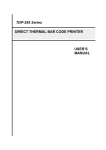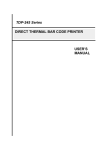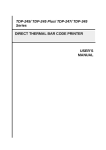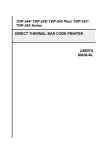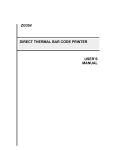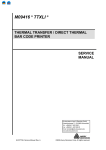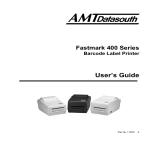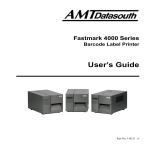Download Plus M-5 User`s guide
Transcript
Fastmark M5 Plus Series Direct Thermal Barcode Printer User’s Guide Document #120523 Rev-A Contents 1. Introduction..............................................................................................1 2. Getting Started .........................................................................................1 2.1 Unpacking and Inspection ....................................................................1 2.2 Equipment Checklist ............................................................................1 2.3 Printer Parts .........................................................................................3 2.3.1 Front View ..................................................................................... 3 2.3.2 Rear View ...................................................................................... 3 3 Setup..........................................................................................................3 3.1 Setting Up the Printer ...........................................................................3 3.2 Loading Media Stock............................................................................4 3.3 Peel-Off Module Installation (Option) ...................................................6 3.4 Loading Labels for Peel-off Mode (Option)...........................................9 3.5 External Media Roll Mount Installation (Option) .................................10 3.6 Cutter Module Installation (Option).....................................................12 3.7 Loading Media in Cutter Mode ...........................................................15 3.8 Internal Ethernet Print Server Module Installation (Option) ................16 3.9 Diagnostic Tool ..................................................................................20 3.9.1 Start the Diagnostic Tool .............................................................. 20 3.9.2 Printer Function (Calibrate, Ethernet setup, RTC setup…) .......... 21 3.10. Install Memory Card ........................................................................21 4. Power on Utilities...................................................................................23 4.1 Gap/Black Mark Sensor Calibration ...................................................23 4.2 Gap/Black Mark Calibration, Self-test, Dump Mode ...........................24 4.3 Printer Initialization .............................................................................27 4.4 Black Mark Sensor Calibration ...........................................................28 4.5 Gap Sensor Calibration ......................................................................28 4.6 PAL application program ....................................................................28 5. Maintenance ...........................................................................................29 5.1 Cleaning .............................................................................................29 6. Troubleshooting.....................................................................................31 6.1 LED Status .........................................................................................31 6.2 Print Quality........................................................................................32 7. LED and Button Operation....................................................................33 7.1 LED ....................................................................................................33 7.2 Button Operation ................................................................................33 Revise History............................................................................................37 i 1. Introduction Thank you for purchasing the AMT Datasouth M5 DT PLUS Direct Thermal Bar Code Printer. Although the printer takes only a small amount of space, it delivers reliable, superior performance. This printer provides direct thermal printing at user selectable speeds of: 2.0, 3.0, 4.0 or 5.0 inches per second. It accepts roll feed, die-cut, and fan-fold labels for printing media. All common bar codes formats are available. Fonts and bar codes can be printed in 4 directions, 8 different alphanumeric bitmap fonts and a build-in true type font capability. You will enjoy high throughput for printing labels with this printer. 2. Getting Started 2.1 Unpacking and Inspection This printer has been specially packaged to withstand damage during shipping. Please carefully inspect the packaging and printer upon opening and prior to installation. Please retain the packaging materials in case you need to reship the printer. 2.2 Equipment Checklist Printer User CD Disk (BarTender Ultralite, Printer User Manuals & Diagnostic Software) Quick start guide USB port cable External universal switching power supply Power Cord Label Spindle Fixing tab x2 1.5” core adapter x2 If any parts are missing, please contact the Customer Service Department of your purchased reseller or distributor. 1 Optional Configurations Peel off module assembly. Guillotine cutter Full cut: Paper thickness: 0.06~ 0.19mm, 500,000 cuts Partial cut: Paper thickness: 0.06~0.12mm, 500,000 cuts Paper thickness: 0.19mm 200,000 cuts Main board integrated with internal Ethernet Internal Ethernet print server module Accessories KP-200 KU-007 plus External Ethernet print server External wireless (802.11b/g) print server External roll mount, media OD. 214 mm (8.4”) with 3” core label spindle Contact CCD contact scanner Long range linear image bar code scanner 2 2.3 Printer Parts 2.3.1 Front View Clear Window Top Cover LED Indicator Feed Button Label Opening Top Cover Open Lever Backing Paper Opening Front Panel Fig.1 Top Front View 2.3.2 Rear View 1. USB Interface 2. Centronics Interface 3. RS-232C DB-9 Interface 4. Power Jack 5. Power Switch 6 6. 1 2 3 4 5 Fig.2 Rear View 3 Setup 3.1 Setting Up the Printer 1. Place the printer on a flat, secure surface. 2. Make sure the power switch is off. 3 Rear Label Guide 3. Connect the printer to the computer with the Centronics or USB cable. 4 Plug the DC power cord into the power jack at the rear of the printer, and then plug the AC power cord into a properly grounded receptacle. Plug USB Power Switch Centronics RS-232C Power Jack Power Supply Power Cord Fig. 5 Attach a power supply to a printer 3.2 Loading Media Stock 1. Insert spindle into a media roll (If your media core is 1 inch, remove the 1.5 inch core adapter from the fixing tab). Media Roll 1.5” Core Adapter Fixing Tab Printing Side Face up 1” Media Spindle Fig 6 Media roll installation (I) 4 2. Open the printer’s top cover by releasing the green levers located on each side of the printer and lifting the top cover. 3. Place a roll of media onto the internal Media Spindle. 4. Feed the media (printing side face up) under the Teflon bar and through the support guides. The media should come to rest outside the printer. Refer to Fig #7. 5. Adjust the black center-biased media guides in or out by turning the adjustment knob so they are slightly touching the edges of the media/backing. Media Guide Media Roll Mount Adjustment Knob Platen Fig. 7 Media roll installation (II) 6. Close the printer top cover slowly and make sure the cover locks securely. Note: Failure to securely close and lock the cover will result in poor print quality. Fig. 8 Close the top cover completely 5 3.3 Peel-Off Module Installation (Option) 1. 2. Open the top cover. Remove the 6 screws in the lower inner cover. Screws Screws 3. 4. Turn over the printer. Remove two screws located near the top cover hinge. Remove screw Remove screw 6 5. Remove the screw at memory card cover. Screw 6. Separate the top, inner, and the lower cover. Lower inner cover Lower cover 7. Thread the cable red connector through the inner cover opening located near the front of the printer. Insert the red cable connector into location JP17 (M5 DT) / JP19 (M5 DT PLUS) on the main board. Install the peel-off module onto the lower inner cover slot. 7 Peel-off module assembly Install (2-places) one side at a time. 8. 9. Gently push the peel-off panel to lock onto the lower inner cover. Reassemble parts in reverse procedures after installing the module. 8 3.4 Loading Labels for Peel-off Mode (Option) 1. Open the peel-off module by pulling it forward. Peel-off Roller Peel-off Panel Fig. 9 Open the peel-off panel 2. Thread the label, printing side facing up, through the support guides. 3. Thread the label through the liner opening, which is beneath the roller. 4. Adjust the black center-biased media guides by turning the adjustment knob to fit the edge of the label/backing. Adjustment Knob Peel-Off Panel Roller Liner Opening Fig. 10 Loading Labels for peel-off mode 5. Lift the peel-off panel up and back into the closed position. 9 6. Close the top cover. Fig. 11 Label loaded completely in peel-off mode 3.5 External Media Roll Mount Installation (Option) 1. Attach an external media roll mount on the bottom of the printer. 2. Install a roll of media on the external roll mount. Media External Media Roll Mount Fig. 12 External media roll mount installation (I) 10 3. Feed the media (printing side face up) into the external opening located at the rear of the printer and then through the media guides. External Media Feed Opening Rear Media Guide Fig. 13 External label roll mount installation (II) 4. Open the printer top cover by pulling the top cover open levers. 5. Continue feeding the media through the internal printer guides and place it on top of the platen. 6. Adjust the media guides by turning adjustment knob to fit the edge of the media/backing. 7. Close the printer top cover. 11 3.6 Cutter Module Installation (Option) 1. Pull the top cover levers to open the top cover. 2. Remove the front panel from the lower cover. Pull straight up to remove. 3. Use a screwdriver to remove 6 screws on the lower inner cover. Screws Screws Fig. 14 Remove 6 screws from lower inner cover 4. Turn over the printer. 5. Remove two screws located near the top cover hinge. 12 6. Remove the screw from the memory card cover, and left the cover off. Memory Card Cover Screw 7. Plug in the Cutter Driver IC at U14(M5 DT) / U30(M5 DT PLUS) socket on the main board. M5 DT Model M5 DT PLUS Model Note: For Non-RoHS PCB, use cutter driver IC A3952SB For RoHS PCB, use cutter driver IC A3953SB 13 8. Hold the lower cover and lift up the lower inner cover. 9. Thread the cutter module cable through the bezel. 10. Connect the cutter module cable to the 4-pin socket on printer PCB. Bezel Socket Fig. 16 Cutter module harness arrangement 11. Reassemble the lower inner cover back onto the lower cover. 12. Install the cutter module into the slots of the printer. Slots each side of the printer Fig. 17 Cutter module installation 13. Reassemble the parts in the reverse order. 14. Close the top cover. 14 3.7 Loading Media in Cutter Mode 1. 2. 3. 4. Open the printer top cover. Insert the spindle into the media roll. Install a media roll onto the roll mount. Thread the media, printing side face up, through the guides, platen and cutter module outlet. Media Guide Adjustment Knob Cutter Media Opening Platen Cutter Fig. 18 Media installation in cutter mode 5. Adjust the black center-biased guides to fit edge of the media/backing. 6. Close the top cover . Fig. 19 Media installation in cutter mode completed 15 3.8 Internal Ethernet Print Server Module Installation (Option) 1. Break through the plastic partially connected at the rear side of lower cover RJ45 interface opening. RJ45 interface opening Remove the screw 2. Remove the screw from the main board. Fasten the metal and plastic standoff. Plastic standoff Metal standoff 16 3. Fasten the RJ45 connector daughter board on the plastic and metal standoff. The ground wire from the mechanism must be screwed on the daughter board with metal standoff. Ground wire Screws RJ45 connector daughter board 4. Connect the print server module interface cable (36PIN) and RJ45 interface cable to print server module. Print server module interface cable RJ45 interface cable 17 5. Remove the 2 screws from the motor bracket and 1 screw in the lower inner cover to install the internal print server. Screw Screws 6. Install the print server module in printer lower inner cover with 3 screws. Screw Screws Internal Print Server Module 18 7. Plug the RJ45 white connector to the RJ45 daughter board connector. 8. Plug the print server module interface cable to connector J1A and J1B on the PCB, the left side harness (with red wire at the left side) is for J1A, the right side harness location is for J1B. M5 DT Model M5 DT PLUS Model 9. Plug the 2 PIN connector on PCB JP26 (M5 DT ) / JP22 (M5 DT PLUS) connector for 5V DC power. 19 3.9 Diagnostic Tool The Diagnostic Utility is a tool that allows users to explore the printer's settings and status; change printer settings; download graphics, fonts, and firmware; create printer bitmap fonts; and to send additional commands to the printer. Using this convenient tool, you can explore the printer status and settings and troubleshoot the printer. Note: This utility works with printer firmware V6.00 and later versions. 3.9.1 Start the Diagnostic Tool 1. Double click on the Diagnostic tool icon to start the software. 2. There are four features (Printer Configuration, File Manager, Bitmap Font Manager, Command Tool) included in the Diagnostic utility. 20 3.9.2 Printer Function (Calibrate, Ethernet setup, RTC setup…) 1. Select the PC interface connected with bar code printer. 2. Click the “Function” button to setting. 3. The detail functions in the Printer Function Group are listed as below. Function Description Factory Default Initialize the printer and restore the settings to factory default. Dump Text To activate the printer dump mode. Configuration Page Print printer configuration. RTC Setup Synchronize printer Real Time Clock with PC. Calibrate Sensor Calibrate the sensor specified in the Printer Setup group media sensor field. Reset Printer Reboot the printer. Print Test Page Print a test page. Ignore AUTO.BAS Ignore the downloaded AUTO.BAS program. Ethernet Setup Setup the IP address, subnet mask, gateway for the on board Ethernet. Note: For more information about Diagnostic Tool, please refer to the diagnostic utility quick start guide in the CD disk \ Utilities directory. 3.10. Install Memory Card 1. Turn the printer over. 2. Remove 1 screw and open the memory card cover. Memory Card Cover 21 3. Plug in the memory card on main board. M5 DT Model (Option) M5 DT PLUS Model (SD card) 4. Reinstall the memory card cover. * Recommended SD card specification. SD V 1.0, V 1.1 128MB SD V 2.0 (SDHC) 4GB class 6 256MB 512MB 1GB -Supported DOS FAT file system. -Folders stored on the SD card should be in the 8.3 filename format. -Approved SD card manufacturer: SanDisk, Transcend 22 4. Power on Utilities There are six power-on utilities to set up and test printer hardware. These utilities are activated by pressing FEED button and by turning on the printer power simultaneously. The utilities are listed as below: 1. Gap/Black Mark sensor calibration 2. Gap/black mark sensor calibration, Self-test and Dump mode 3. Printer initialization 4. Black mark sensor calibration 5. Gap sensor calibration 6. Skip AUTO.BAS 4.1 Gap/Black Mark Sensor Calibration Gap/black mark sensor sensitivity should be calibrated at the following conditions: 1. A brand new printer 2. Change label stock. 3. Printer initialization. Please follow the steps below to calibrate the gap/black sensor: 1.Turn off the power switch. 2. Hold on the button then turn on the power switch. 3 Release the button when LED becomes red and blinking. (Any red will do during the 5 blinks). It will calibrate the gap/black mark sensor sensitivity. The LED color will be changed as following order Amber red (5 blinks) amber (5 blinks) green (5 blinks) blinks) red/amber (5 blinks) solid green It calibrates the sensor and measures the label length. green/amber (5 Note: Please select gap or black mark sensor by GAP or BLINE command prior to calibrate the sensor. For more information about GAP and BLINE command, please refer to programming manual. 23 4.2 Gap/Black Mark Calibration, Self-test, Dump Mode While calibrate the gap/black mark sensor, printer will measure the label length, print the internal configuration (self-test) and then enter the dump mode. Please follow the steps as below. 1.Turn off the power switch. 2. Hold on the button then turn on the power switch. 3. Release the button when LED becomes amber and blinking. (Any amber will do during the 5 blinks). The LED color will be changed as following order. Amber red (5 blinks) amber (5 blinks) green (5 blinks) green/amber (5 blinks) red/amber (5 blinks) solid green It calibrates the sensor and measures the label length and prints internal settings then enter the dump mode. Note: Please select gap or black mark sensor by Diagnostic Tool or by GAP or BLINE command prior to calibrate the sensor. For more information about GAP and BLINE command, please refer to programming manual. 24 Self-test Printer will print the printer configuration after gap/black mark sensor calibration. Self-test printout can be used to check if there is any dot damage on the heater element, printer configurations and available memory space. Self-test printout Print head check pattern Model name and F/W version Printed mileage (meter) Firmware checksum Serial port configuration Code page Country code Print speed (inch/sec) Print darkness Label size (inch) Gap distance (inch) Gap/black mark sensor sensitivity Numbers of download files Total & available memory space Note: 1. The physical flash memory for RoHS compliant version is 2MB Flash and 2MB DRAM (M5 DT Model) / 8MB SDRAM (M5 DT PLUS Model) 2. System occupies 960 KB in Flash memory so total flash memory space for user downloading is 1088 KB 3. System occupies 1792 KB in DRAM so total DRAM memory space for user downloading is 256 KB (M5 DT Model) System occupies 7936 KB in SDRAM so total SDRAM memory space for user downloading is 256 KB (M5 DT PLUS Model) 25 Dump mode Printer will enter dump mode after printing printer configuration. In the dump mode, all characters will be printed in 2 columns as following. The left side characters are received from your system and right side data are the corresponding hexadecimal value of the characters. It allows users or engineers to verify and debug the program. Dump mode printout Note: Turn off and on the power switch to reset the printer for normal printing. 26 4.3 Printer Initialization Printer initialization is used to clear DRAM and restore printer settings to defaults. The only one exception is ribbon sensitivity, which will note be restored to default. Printer initialization is activated by the following procedures. 1. Turn off the power switch. 2. Hold on the button then turn on the power switch. 3. Release the button when LED turns green after 5 amber blinks. (Any green will do during the 5 blinks). The LED color will be changed as following: Amber blinks) red (5 blinks) amber (5 blinks) green (5 blinks) red/amber (5 blinks) solid green green/amber (5 Printer configuration will be restore to defaults as below after initialization. Parameter Default setting Speed 127 mm/sec (5 ips) Density 8 Label Width 4” (101.6 mm) Label Height 4” (101.6 mm) Media Sensor Type Gap sensor Gap Setting 0.12” (3.0 mm) Print Direction 0 Reference Point 0,0 (upper left corner) Offset 0 Tear Mode On Peel off Mode Off Cutter Mode Off Serial Port Settings 9600 bps, none parity, 8 data bits, 1 stop bit Code Page 850 Country Code 001 Clear Flash Memory No IP Address DHCP Note: Always do gap/black mark sensor calibration after printer initialization. 27 4.4 Black Mark Sensor Calibration Set black mark sensor as media sensor and calibrate the black mark sensor. Please follow the steps as below. 1. Turn off the power switch. 2. Hold on the button then turn on the power switch. 3. Release the button when LED turns green/amber after 5 green blinks. (Any green/amber will do during the 5 blinks). The LED color will be changed as following: Amber blinks) red (5 blinks) amber (5 blinks) green (5 blinks) red/amber (5 blinks) solid green green/amber (5 4.5 Gap Sensor Calibration Set gap sensor as media sensor and calibrate the gap sensor. Please follow the steps as below. 1. Turn off the power switch. 2. Hold on the button then turn on the power switch. 3. Release the button when LED turns red/amber after 5 green/amber blinks. (Any red/amber will do during the 5 blinks). The LED color will be changed as following: Amber red (5 blinks) amber (5 blinks) green (5 blinks) green/amber (5 blinks) red/amber (5 blinks) solid green 4.6 PAL application program PAL programming language allows user to download an auto execution file to flash memory. The printer will run the PAL application program immediately when turning on printer power. The PAL application program can be interrupted by the power-on utility. Please follow the procedures below to skip a PAL application program: 1. Turn off printer power. 2. Press the FEED button and then turn on power. 3. Release the FEED button when LED becomes solid green. The LED color will be changed as following: Amber red (5 blinks) amber (5 blinks) green (5 blinks) blinks) red/amber (5 blinks) solid green 4. Printer will be interrupted to run the PAL application program. 28 green/amber (5 5. Maintenance 5.1 Cleaning This session presents the clean tools and methods to maintain your printer. 1. Please use one of following material to clean the printer. Cotton swab (Head cleaner pen) Lint-free cloth Vacuum / Blower brush 100% ethanol 2. The cleaning process is described as following Printer Part Method Interval 1. Always turn off the printer Clean the print head when before cleaning the print head. changing a new label roll 2. Allow the print head to cool for a minimum of one minute. 3. Use a cotton swab (Head cleaner pen) and 100% ethanol to clean the print head surface. Print Head 1. Turn the power off. 2. Rotate the platen roller and wipe it thoroughly with 100% Platen Roller ethanol and a cotton swab, or lint-free cloth. Clean the platen roller when changing a new label roll Tear Bar/Peel Use the lint-free cloth with 100% As needed 29 Bar ethanol to wipe it. Sensor Compressed air or vacuum Monthly Exterior Wipe it with water-dampened cloth As needed Interior Brush or vacuum As needed Note: Do not touch printer head by hand. If you touch it careless, please use ethanol to clean it. Use 100% Ethanol. DO NOT use medical alcohol, which may damage the printer head. Regularly clean the print head and supply sensors once change a new ribbon to keep printer performance and extend printer life. 30 6. Troubleshooting The following guide lists the most common problems that may be encountered when operating this bar code printer. If the printer still does not function after all suggested solutions have been invoked, please contact the Customer Service Department of your purchased reseller or distributor for assistance. 6.1 LED Status This section lists the common problems that according to the LED status and other problems you may encounter when operating the printer. Also, it provides solutions. LED Status / Color OFF Printer Status No response Possible Cause No power Recovery Procedure * Turn on the power switch. * Check if the green LED is lit on power supply. If it is not lit on, power supply is broken. * Check both power connections from the power cord to the power supply and from the power supply to the printer power jack if they are connected securely. Solid Green ON The printer is ready to * No action necessary. use Green with Pause The printer is paused * Press the FEED button to resume for printing. blinking Red with blinking Error The out of label or the 1. Out of label printer setting is not correct * Load a roll of label and follow the instructions in loading the media then press the FEED button to resume for printing. 2. Printer setting is not correct * Initialize the printer by instructions in “Power on Utility” or “Diagnostic Tool”. Note: Printer status can be easily shown on the Diagnostic Tool. For more information about the Diagnostic Tool, please refer to the instruction in the software CD disk. 31 6.2 Print Quality Problem Possible Cause Check if interface cable is well Recovery Procedure Re-connect cable to interface. connected to the interface connector. The serial port cable pin configuration Please replace the cable with pin to is not pin to pin connected. Not Printing pin connected. The serial port setting is not consistent Please reset the serial port setting. between host and printer. The port specified in the Windows Select the correct printer port in the driver is not correct. driver. The Ethernet IP, subnet mask, gateway Configure the IP, subnet mask and is not configured properly. No print on the label Continuous feeding labels gateway. Follow the instructions in loading the Label loaded not correctly. media. The printer setting may go wrong. Please do the initialization and gap/black mark calibration. Gap/black mark sensor sensitivity is not Calibrate the gap/black mark sensor. set properly (sensor sensitivity is not enough) Paper Jam Set label size exactly as installed paper in the labeling software or program. Labels may be stuck inside the printer Remove the stuck label. Make sure label size is set properly. mechanism near the sensor area. Poor Print Quality Top cover is not closed properly. Close the top cover completely and make sure the right side and left side levers are latched properly. Check if supply is loaded correctly. Reload the supply. Media are incompatible. Change the label combination. Check if dust or adhesives are Clean the print head. accumulated on the print head. Check if print density is set properly. Check print head test pattern if head element is damaged. 32 Adjust the print density and print speed. Run printer self-test and check the print head test pattern if there is dot missing in the pattern. 7. LED and Button Operation 7.1 LED LED Color Description Green/ Solid This illuminates that the power is on and the device is ready to use. Green/ Flash This illuminates that the system is downloading data from PC to memory and the printer is paused. Amber This illuminates that the system is clearing data from printer. Red / Solid This illuminates printer head open, cutter error. Red / Flash This illuminates a printing error, such as head open, paper empty, paper jam, or memory error etc. 7.2 Button Operation Feed Pause Press the button when the LED is green. It feeds the label to the beginning of the next label. Press the feed button during printing. The printing job is suspended. 33 Gap/Black Mark 1.Turn off the power switch. Sensor Calibration 2. Hold on the button then turn on the power switch. 3 Release the button when LED becomes red and blinking. (Any red will do during the 5 blinks). It will calibrate the gap/black mark sensor sensitivity. The LED color will be changed as following order Amber red (5 blinks) amber (5 blinks) green (5 blinks) green/amber (5 blinks) red/amber (5 blinks) solid green It calibrates the sensor and measures the label length. Note: Please select gap or black mark sensor by GAP or BLINE command prior to calibrate the sensor. For more information about GAP and BLINE command, please refer to programming manual. Gap/Black Mark 1.Turn off the power switch. Sensor Calibratio, 2. Hold on the button then turn on the power switch. 3. Release the button when LED becomes amber and blinking. Label Length (Any amber will do during the 5 blinks). Measurement, The LED color will be changed as following order. Self Test and enter Amber red (5 blinks) amber (5 blinks) green Dump Mode (5 blinks) green/amber (5 blinks) red/amber (5 blinks) solid green It calibrates the sensor and measures the label length and prints internal settings then enter the dump mode. Note: Please select gap or black mark sensor by GAP or BLINE command prior to calibrate the sensor. For more information about GAP and BLINE command, please refer to programming manual. 34 Printer Initialization 1. Turn off the power switch. 2. Hold on the button then turn on the power switch. 3. Release the button when LED turns green after 5 amber blinks. (Any green will do during the 5 blinks). The LED color will be changed as following: Amber blinks) blinks) red (5 blinks) amber (5 blinks) green (5 green/amber (5 blinks) red/amber (5 solid green Always do gap/black mark sensor calibration after printer initialization. Black Mark Sensor 1. Turn off the power switch. 2. Hold on the button then turn on the power switch. Calibration 3. Release the button when LED turns green/amber after 5 green blinks. (Any green/amber will do during the 5 blinks). The LED color will be changed as following: Amber red (5 blinks) amber (5 blinks) green (5 blinks) blinks) Gap Sensor Calibration green/amber (5 blinks) solid green red/amber (5 1. Turn off the power switch. 2. Hold on the button then turn on the power switch. 3. Release the button when LED turns red/amber after 5 green/amber blinks. (Any red/amber will do during the 5 blinks). The LED color will be changed as following: Amber red (5 blinks) amber (5 blinks) green (5 blinks) blinks) green/amber (5 blinks) solid green 35 red/amber (5 Skip AUTO.BAS 1. Turn off printer power. 2. Press the FEED button and then turn on power. 3. Release the FEED button when LED becomes solid green. The LED color will be changed as following: Amber red (5 blinks) amber (5 blinks) green (5 blinks) green/amber (5 blinks) red/amber (5 blinks) solid green 4. Printer will be interrupted to run the AUTO.BAS program. 36 Revise History Date Content Editor 9-14-08 Pre-production Release J. Nolan 37 Document #120523 Rev-A Corporate Headquarters Manufacturing/Service 803 Camarillo Springs Road, Suite-D Camarillo, CA 93012 TEL: 800.215.9192 FAX: 805.484.5282 Web site: www.AMTDatasouth.com 5033 Sirona Drive, Suite-800 Charlotte, NC 28273 TEL: 800.476.2120 FAX: 704.525.6104








































